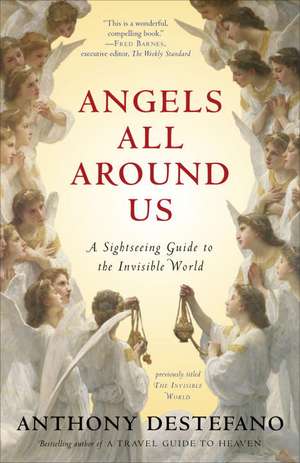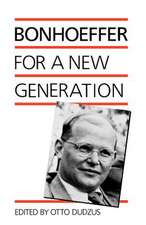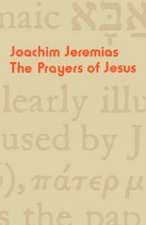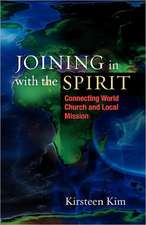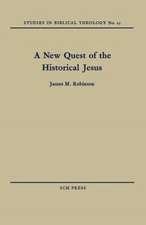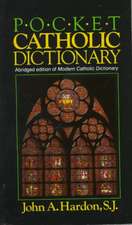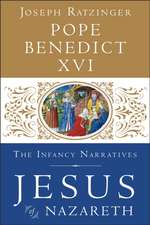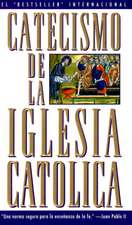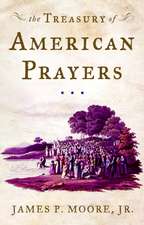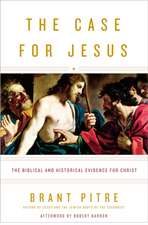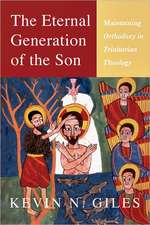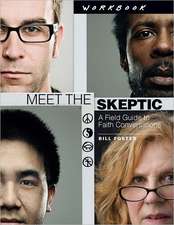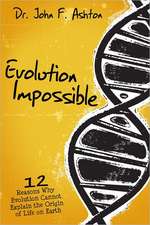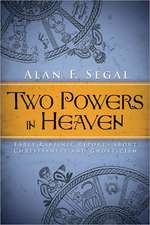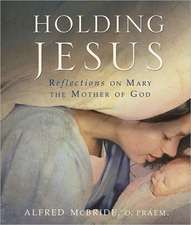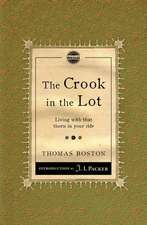Angels All Around Us: A Sightseeing Guide to the Invisible World
Autor Anthony DeStefanoen Limba Engleză Paperback – 15 oct 2012
Completely consistent with traditional Christian teaching, Angels All Around Us will help readers embrace a certitude that makes it easier to act according to their moral beliefs, give them a greater sense of the richness of life, and show them that no amount of suffering-physical, mental, or emotional-will ever be able to destroy the profound sense of inner peace that they can experience on a daily basis.
Preț: 88.45 lei
Nou
Puncte Express: 133
Preț estimativ în valută:
16.92€ • 17.67$ • 14.01£
16.92€ • 17.67$ • 14.01£
Carte disponibilă
Livrare economică 15-29 martie
Preluare comenzi: 021 569.72.76
Specificații
ISBN-13: 9780385522229
ISBN-10: 0385522223
Pagini: 220
Dimensiuni: 130 x 203 x 11 mm
Greutate: 0.17 kg
Editura: IMAGE
ISBN-10: 0385522223
Pagini: 220
Dimensiuni: 130 x 203 x 11 mm
Greutate: 0.17 kg
Editura: IMAGE
Notă biografică
Anthony DeStefanois the bestselling author of over twenty-five Christian books for adults and children. His nonfiction adult books have been published in eighteen different countries and twelve different languages. A native New Yorker, Anthony attended Stuyvesant High School in Manhattan, where his English teacher, Frank McCourt, Pulitzer Prize–winning author ofAngela’s Ashes, sparked his interest in becoming a children’s book author. In fact, Anthony wrote his first picture book,Little Star,as an assignment for one of McCourt’s writing classes. Three decades later it was finally published and became a bestseller. Anthony is an avid pilot and successful businessman. He lives in New Jersey with his wife, Jordan.
Extras
chapter 1
The Haunt Detector
Everybody has one. The Reverend Frank Pavone used to call it the Haunt Detector. What is it?
Very simply, it's the little alarm that goes off in our heads whenever we detect that something mysterious or supernatural has occurred. Science fiction and horror writers have referred to it by other names-the sixth sense, the shining. But for some reason, I've always liked "haunt detector" best.
We actually have all kinds of "detecting" mechanisms built into our nervous systems. They don't have fancy scientifi c names, but they exist nonetheless. For instance, we all have "lie detectors." When someone who's not very slick tries to scam us, we're usually able to tell just from their body language and their voice. We all have "love detectors." We can just feel it in our bones when someone has deep feelings of attachment for us- or when they don't. We all have "right and wrong" detectors- better known as consciences. When we do something not quite right, we know it because we feel an unmistakable pang of guilt. And, of course, we all have "sex detectors," which let us know pretty quickly when we're physically attracted to another person.
Well, we all have "haunt detectors," too. And they let us know whenever something especially eerie or out of the ordinary is happening around us. You know the kind of thing. You could be sitting around relaxing one day at home, and for no special reason you start thinking about someone. Maybe you haven't thought about this particular person in years. Then the phone rings; you pick it up, and, amazingly, it's that person! Many of us have experienced this phenomenon. What is it?
I'll never forget something that happened to my mother many years ago. It was the middle of the night and she was sleeping soundly. Suddenly she woke up and bolted upright in bed. She had heard the sound of her own mother's voice calling out to her in a thick Italian accent: "Laura, Laura, help me." My mother was startled and her heart was racing; she had clearly heard her name spoken. But it couldn't be her mother calling; she lived on the other side of Brooklyn, and it was so late. My mother thought that perhaps it was just a bad dream so she went back to sleep. But the next morning she received a phone call from the hospital. Her mother had gotten up to go to the bathroom during the night and had fallen. She was in the hospital with a broken hip. For hours she had been on the fl oor, moaning for help. How in the world did my mother hear her? Was it just a coincidence?
Then there are stories that are totally unexplainable. I read a newspaper account a few years ago about a four-year-old girl in upstate New York who had been diagnosed with a brain tumor. The whole community had been praying fervently for her. All the churches in the neighborhood-Lutheran, Evangelical, Catholic-were all united in prayer that a miracle would take place. The little girl had been through so much: she'd had more than twenty MRIs, and it was decided that the only remaining course of action was brain surgery. She wasn't even expected to make it through the operation, but it was the only chance she had. The day of the surgery her head was shaved, her blood was taken, she was hooked up to all kinds of machines, and the team of doctors scrubbed and put on their surgical gowns. One fi nal MRI had to be done to determine the exact location of the tumor. Just before the child was wheeled into the testing room, a sweet, pretty young nurse came in and took her hand. She told the little girl not to worry because she was "all better," that God had "cured" her and that she would be going home soon. The little girl later said that the nurse was so nice to her and so "beautiful" that she felt all warm and peaceful inside.
When the MRI was taken, the lab technicians gasped in disbelief. No matter how hard they searched, they couldn't locate the tumor. They took more tests, but the results were the same. The tumor was gone. No surgery was performed that day-or any day-because there was nothing to operate on. The little girl was completely healed. What happened? And who was the mysterious woman who came in and told the girl she was cured? None of the other nurses could identify her and no one ever saw her again. Was she an angel, as some in the little girl's family believed? No one knows for sure. But everyone, from the doctors to the lab technicians to the parents to the people in the community, was aware that something incredible had taken place. Everyone's haunt detectors went off at once.
Of course, not all mysterious experiences are as strange as this. A person's haunt detector can begin registering at any time. You can be listening to a powerful piece of music or watching a spectacular sunset; reading a particularly moving piece of literature or worshipping at church. You can be embracing the person you love most in the world or sitting in your home, cozy and warm by the fire. Or you can just be walking down the street thinking about all the things in your life that have brought you to where you are. You can be doing any of these things, and out of nowhere a tingle will suddenly run up your spine, telling you that something more is going on than meets the eye. Something that transcends understanding.
What is it? No one really knows. But it invariably triggers a feeling deep in your soul-a feeling of desire, of yearning, of hope; hope that there is something special about life; that there is some hidden meaning and purpose to all the suffering we have to go through; that there is something beyond science, beyond the senses-something totally invisible yet totally real. In Latin, the experience is called mysterium tremendum et fascinans. And our haunt detectors can sense it.
Of course, we have to be careful when trying to discern the meaning of such feelings and phenomena. Spiritual people are sometimes too quick to attribute the cause of strange occurrences to God; they're too hasty in coming to the conclusion that just because something seems unexplainable it must have a divine or supernatural origin. That simply isn't the case. Many amazing things that happen in this world aren't "miraculous" at all. It's a fact, for example, that human beings have all kinds of natural abilities that are untapped; abilities that are only now being identified and studied by science. We've all heard about mothers and fathers who display superhuman strength when trying to rescue their children from harm. We've all seen examples of people with severe learning disabilities who are able to sit down at a piano without any formal training and play the most complicated pieces of classical music. The human brain is an incredible organ and has many powers that still aren't fully understood. Because of this, it's extremely difficult for us to tell what's natural, what's supernatural, what's legitimately from God, what's from the devil, and what's just plain old human imagination. Practically everything that happens in life is subject to misinterpretation. That's why it's so dangerous to become fixated on the supernatural. Too often it leads to superstition or belief in the occult or false spirituality or even-in extreme cases-insanity.
We just can't afford to make blind assumptions. We have to seek the expert guidance of doctors, psychologists, scientists, theologians, and church leaders. But neither can we dismiss all these remarkable experiences as mere fantasy. And that's what many people do today. Not only do they reject what's fanciful and frivolous-they reject everything. They throw the baby out with the bathwater. They claim that there is no reality other than the reality of the senses, the reality of the material world. In many ways this is an even greater mistake. After all, it's one thing to be cautious and discerning when it comes to spiritual matters; it's quite another to deny the existence of the spiritual realm altogether.
If we do that, we risk falling into what has been called the "superstition of materialism," the myth that this world is made up of physical objects and nothing else; that everything in life-our thoughts, our emotions, our hopes, our ambitions, our passions, our memories, our philosophies, our politics, our beliefs in God and salvation and damnation-that all of this is purely the result of biochemical reactions and the movement of molecules in our brain. What nonsense!
We can't reduce the whole of reality to what our senses tell us for the simple reason that our senses are notorious for lying to us. Our senses tell us that the world is flat, yet it's not. Our senses tell us that the world is chaotic, yet we know that on both a micro and a macro level, it's incredibly organized. Our senses tell us that we're stationary, yet we're really moving at dizzying speeds. Right now, for instance, you're sitting down quietly reading this book; but did you know that you're actually traveling at twenty thousand miles per hour? That's the rate at which the earth and the entire galaxy are racing through space. Can you feel or see that motion in any way? Of course not. It's completely invisible to your senses. In fact, the only reason that you're not physically hurled into orbit right now is because another invisible force-gravity-is holding you in place. There are all kinds of unseen forces and laws that govern the universe. They're all invisible-and they're all very real.
The most important things in life can't be seen with the eyes. Ideas can't be seen. Love can't be seen. Honor can't be seen. This isn't a new concept. Judaism and Christianity and Islam and Buddhism and Taoism have all taught for thousands of years that the highest forms of reality are invisible. God is invisible, and he created the universe. Our souls are invisible, and they give life to our bodies. Angels are invisible, and they're the most powerful of God's creatures.
Are these unseen realities difficult for us to grasp? Of course. When the alarm clock goes off in the morning and we stumble out of bed to shower and dress and go to work, it's hard for us to focus on anything so intangible as the spiritual realm. After all, how can we hope to find an invisible God when we sometimes have trouble finding the milk in the refrigerator when it's staring us right in the face? C. S. Lewis said that human beings find it almost impossible to "believe in the unfamiliar while the familiar is before their eyes." One of the great psychological obstacles to having a strong faith is the very "ordinariness" of life.
In the first chapter of The Screwtape Letters, Lewis writes about the diabolical strategy that an invisible demon uses on an old, hardened atheist. The atheist, for the first time in his life, is starting to ask himself questions about the existence of God. The demon naturally wants to prevent this. But rather than waste his time arguing with the man about theology, the demon plants the suggestion in the atheist's mind to go out and have some lunch. Once in the street, the atheist sees the newspaper boy and the taxis going by and a thousand other small details. With that healthy dose of "real life" he doesn't even bother continuing his search for God. After all, in light of all those clear, crisp, ordinary realities, how could there be any such nebulous thing as metaphysical truth?
We face the same danger. Because we're so familiar with desks and chairs and pots and pans and cell phones and video games, it can be a real challenge for us to think about spiritual matters. Our haunt detectors can become so dulled and rusty from disuse that they hardly register any kind of invisible activity except the most extraordinary. The end result is that, although we may not become full-fledged atheists, we can actually begin behaving as if we were. Without even realizing it, a giant gap can form between what we profess to believe and how we go about acting in our everyday lives.
We all know how true this is. We say we believe in the Bible and the moral law, but then we have trouble going even a few weeks without breaking most of the Ten Commandments. We say we believe in the power of prayer and God's grace, but few of us actually turn to God unless we're in some sort of a jam. We act this way partly because of human nature. But it's also because the temptations we face seem so real, while the world of the spirit seems so hazy and unreal by comparison. In this hedonistic society of ours, in which we're confronted every day by thousands of images designed to appeal to our sensual appetites, it's very easy to be seduced. When a woman who loves chocolate passes a Godiva shop and sees a window full of delicious truffles, caramels, and other assorted treats, it's hard for her to consider the spiritual value of fasting or the Christian belief that the body is the "temple of the Holy Spirit." When a man with a healthy libido strolls down the streets of lower Manhattan on a sultry summer afternoon and is confronted by a parade of sexy, scantily clad women, it's tough for him to think about formless beings like angels. What are visible to him at that moment-the shapely forms enticing his senses-are just too much for him to resist. The spiritual world doesn't seem to stand a chance.
And that's where this book comes in. What I'd like to do in the following pages is attempt to render that spiritual world a bit more clearly for you. I'd like to try to make the invisible realities that surround us just a little more visible. My hope is that, by doing this, these realities won't seem so unfamiliar in the future. And the more familiar they are, the easier it will be to understand them and to have absolute faith in their existence. Once you're armed with that kind of certitude, three things will naturally happen: (1) It will be easier for you to act in sync with your moral beliefs; (2) your life will be much fuller, richer, and more exciting than you ever imagined possible; and
(3) no amount of suffering-physical, mental, or emotional- will ever be able to destroy the profound inner sense of peace that you'll experience on a daily basis.
Big promises, I know. But that's how important this subject is.
So how does one go about making the invisible visible? Well, as I said, there's an extraordinarily rich theology from which we can draw. The traditional Judeo-Christian view of the invisible world has been largely displaced by a kind of fortune cookie philosophy of life that's neither truly believable nor truly remarkable. Just browse through the New Age section of your local bookstore and you'll see what I mean. This book is not going to be like that. It's not going to be about vampires or gremlins or ghosts or leprechauns or psychics or poltergeists or palm readers or UFOs or fairies or the "Force." This book is about reality-cold, hard reality.
In fact, one of the great things about the invisible realm is that you don't have to be a "religious fanatic" or the follower of some cult to believe in it. You can be a level-headed pragmatist. You can be a realist. You can even be a cynic. You certainly don't have to check your brains at the door before entering this world. And you don't have to be afraid that deep thinking is going to nullify what you learn there. Indeed, everything we're going to talk about in this book is based on solid theology, informed by common sense and logic, and backed up by biblical scholarship and the universal teaching of the Christian church over the past two thousand years.
No less a genius than Albert Einstein once said: "The most beautiful thing we can experience in life is the mysterious. It is the source of all true art and science. He to whom this emotion is a stranger, who can no longer pause to wonder and stand rapt in awe, is as good as dead: for his eyes are closed."
Too many people go through life today with their eyes closed. They miss out on the mysterious because they're so fi xated on what they can see and smell and touch and taste and hear. They're so steeped in the "superstition of materialism" that they're totally blind to the existence of another world-a world that is radically different from the one they're familiar with, but a world nonetheless.
What kind of world is it? I've said that this book is not about make-believe; it's not going to be some kind of Peter Pan-style fairy tale. Yet I'd be lying if I didn't tell you that the hidden world God has created for us is more marvelous and exciting than a thousand Neverlands. It's a world filled with miracles, a world in which all the actions you take and decisions you make have spiritual consequences-consequences that affect the lives of millions of human beings. A world in which the men and women you meet on the street are never "ordinary"-because they all have immortal, everlasting souls and are destined to be either saints in Heaven or the damned of hell. A world in which a deadly, invisible, and diabolical war has been raging for eons-a war infinitely more terrifying than any started by Hitler, Stalin, or Osama bin Laden. A world where the highest values are completely opposite those of our secular society-where weakness equals strength, sacrifi ce equals salvation, and suffering equals unlimited power. Finally, it's a world in which you're never really alone, for even when you're by yourself watching TV or reading a book, taking a walk or sitting at the table having breakfast, you have company-because you're surrounded by angels.
Let's try for a few minutes to "see" this incredible world. Not with the eyes in your head, but with the eyes in your soul. All you really have to do is take a deep breath, shake off the stresses and cares that normally consume you, find a place where you can concentrate in quiet stillness, and do your best to keep an open mind. For just a little while, follow the biblical injunction to "walk by faith and not by sight."
And if-as you're reading-you happen to feel a tingle up your spine or experience the eerie sensation that something beyond your comprehension is taking place, don't get alarmed. It's just your haunt detector going off-telling you that the veil that has covered God's hidden creation from time immemorial is being pulled back ever so slightly, allowing you a chance to peek inside.
Don't be afraid to look. Believe me-you'll be amazed by what you see.
The Haunt Detector
Everybody has one. The Reverend Frank Pavone used to call it the Haunt Detector. What is it?
Very simply, it's the little alarm that goes off in our heads whenever we detect that something mysterious or supernatural has occurred. Science fiction and horror writers have referred to it by other names-the sixth sense, the shining. But for some reason, I've always liked "haunt detector" best.
We actually have all kinds of "detecting" mechanisms built into our nervous systems. They don't have fancy scientifi c names, but they exist nonetheless. For instance, we all have "lie detectors." When someone who's not very slick tries to scam us, we're usually able to tell just from their body language and their voice. We all have "love detectors." We can just feel it in our bones when someone has deep feelings of attachment for us- or when they don't. We all have "right and wrong" detectors- better known as consciences. When we do something not quite right, we know it because we feel an unmistakable pang of guilt. And, of course, we all have "sex detectors," which let us know pretty quickly when we're physically attracted to another person.
Well, we all have "haunt detectors," too. And they let us know whenever something especially eerie or out of the ordinary is happening around us. You know the kind of thing. You could be sitting around relaxing one day at home, and for no special reason you start thinking about someone. Maybe you haven't thought about this particular person in years. Then the phone rings; you pick it up, and, amazingly, it's that person! Many of us have experienced this phenomenon. What is it?
I'll never forget something that happened to my mother many years ago. It was the middle of the night and she was sleeping soundly. Suddenly she woke up and bolted upright in bed. She had heard the sound of her own mother's voice calling out to her in a thick Italian accent: "Laura, Laura, help me." My mother was startled and her heart was racing; she had clearly heard her name spoken. But it couldn't be her mother calling; she lived on the other side of Brooklyn, and it was so late. My mother thought that perhaps it was just a bad dream so she went back to sleep. But the next morning she received a phone call from the hospital. Her mother had gotten up to go to the bathroom during the night and had fallen. She was in the hospital with a broken hip. For hours she had been on the fl oor, moaning for help. How in the world did my mother hear her? Was it just a coincidence?
Then there are stories that are totally unexplainable. I read a newspaper account a few years ago about a four-year-old girl in upstate New York who had been diagnosed with a brain tumor. The whole community had been praying fervently for her. All the churches in the neighborhood-Lutheran, Evangelical, Catholic-were all united in prayer that a miracle would take place. The little girl had been through so much: she'd had more than twenty MRIs, and it was decided that the only remaining course of action was brain surgery. She wasn't even expected to make it through the operation, but it was the only chance she had. The day of the surgery her head was shaved, her blood was taken, she was hooked up to all kinds of machines, and the team of doctors scrubbed and put on their surgical gowns. One fi nal MRI had to be done to determine the exact location of the tumor. Just before the child was wheeled into the testing room, a sweet, pretty young nurse came in and took her hand. She told the little girl not to worry because she was "all better," that God had "cured" her and that she would be going home soon. The little girl later said that the nurse was so nice to her and so "beautiful" that she felt all warm and peaceful inside.
When the MRI was taken, the lab technicians gasped in disbelief. No matter how hard they searched, they couldn't locate the tumor. They took more tests, but the results were the same. The tumor was gone. No surgery was performed that day-or any day-because there was nothing to operate on. The little girl was completely healed. What happened? And who was the mysterious woman who came in and told the girl she was cured? None of the other nurses could identify her and no one ever saw her again. Was she an angel, as some in the little girl's family believed? No one knows for sure. But everyone, from the doctors to the lab technicians to the parents to the people in the community, was aware that something incredible had taken place. Everyone's haunt detectors went off at once.
Of course, not all mysterious experiences are as strange as this. A person's haunt detector can begin registering at any time. You can be listening to a powerful piece of music or watching a spectacular sunset; reading a particularly moving piece of literature or worshipping at church. You can be embracing the person you love most in the world or sitting in your home, cozy and warm by the fire. Or you can just be walking down the street thinking about all the things in your life that have brought you to where you are. You can be doing any of these things, and out of nowhere a tingle will suddenly run up your spine, telling you that something more is going on than meets the eye. Something that transcends understanding.
What is it? No one really knows. But it invariably triggers a feeling deep in your soul-a feeling of desire, of yearning, of hope; hope that there is something special about life; that there is some hidden meaning and purpose to all the suffering we have to go through; that there is something beyond science, beyond the senses-something totally invisible yet totally real. In Latin, the experience is called mysterium tremendum et fascinans. And our haunt detectors can sense it.
Of course, we have to be careful when trying to discern the meaning of such feelings and phenomena. Spiritual people are sometimes too quick to attribute the cause of strange occurrences to God; they're too hasty in coming to the conclusion that just because something seems unexplainable it must have a divine or supernatural origin. That simply isn't the case. Many amazing things that happen in this world aren't "miraculous" at all. It's a fact, for example, that human beings have all kinds of natural abilities that are untapped; abilities that are only now being identified and studied by science. We've all heard about mothers and fathers who display superhuman strength when trying to rescue their children from harm. We've all seen examples of people with severe learning disabilities who are able to sit down at a piano without any formal training and play the most complicated pieces of classical music. The human brain is an incredible organ and has many powers that still aren't fully understood. Because of this, it's extremely difficult for us to tell what's natural, what's supernatural, what's legitimately from God, what's from the devil, and what's just plain old human imagination. Practically everything that happens in life is subject to misinterpretation. That's why it's so dangerous to become fixated on the supernatural. Too often it leads to superstition or belief in the occult or false spirituality or even-in extreme cases-insanity.
We just can't afford to make blind assumptions. We have to seek the expert guidance of doctors, psychologists, scientists, theologians, and church leaders. But neither can we dismiss all these remarkable experiences as mere fantasy. And that's what many people do today. Not only do they reject what's fanciful and frivolous-they reject everything. They throw the baby out with the bathwater. They claim that there is no reality other than the reality of the senses, the reality of the material world. In many ways this is an even greater mistake. After all, it's one thing to be cautious and discerning when it comes to spiritual matters; it's quite another to deny the existence of the spiritual realm altogether.
If we do that, we risk falling into what has been called the "superstition of materialism," the myth that this world is made up of physical objects and nothing else; that everything in life-our thoughts, our emotions, our hopes, our ambitions, our passions, our memories, our philosophies, our politics, our beliefs in God and salvation and damnation-that all of this is purely the result of biochemical reactions and the movement of molecules in our brain. What nonsense!
We can't reduce the whole of reality to what our senses tell us for the simple reason that our senses are notorious for lying to us. Our senses tell us that the world is flat, yet it's not. Our senses tell us that the world is chaotic, yet we know that on both a micro and a macro level, it's incredibly organized. Our senses tell us that we're stationary, yet we're really moving at dizzying speeds. Right now, for instance, you're sitting down quietly reading this book; but did you know that you're actually traveling at twenty thousand miles per hour? That's the rate at which the earth and the entire galaxy are racing through space. Can you feel or see that motion in any way? Of course not. It's completely invisible to your senses. In fact, the only reason that you're not physically hurled into orbit right now is because another invisible force-gravity-is holding you in place. There are all kinds of unseen forces and laws that govern the universe. They're all invisible-and they're all very real.
The most important things in life can't be seen with the eyes. Ideas can't be seen. Love can't be seen. Honor can't be seen. This isn't a new concept. Judaism and Christianity and Islam and Buddhism and Taoism have all taught for thousands of years that the highest forms of reality are invisible. God is invisible, and he created the universe. Our souls are invisible, and they give life to our bodies. Angels are invisible, and they're the most powerful of God's creatures.
Are these unseen realities difficult for us to grasp? Of course. When the alarm clock goes off in the morning and we stumble out of bed to shower and dress and go to work, it's hard for us to focus on anything so intangible as the spiritual realm. After all, how can we hope to find an invisible God when we sometimes have trouble finding the milk in the refrigerator when it's staring us right in the face? C. S. Lewis said that human beings find it almost impossible to "believe in the unfamiliar while the familiar is before their eyes." One of the great psychological obstacles to having a strong faith is the very "ordinariness" of life.
In the first chapter of The Screwtape Letters, Lewis writes about the diabolical strategy that an invisible demon uses on an old, hardened atheist. The atheist, for the first time in his life, is starting to ask himself questions about the existence of God. The demon naturally wants to prevent this. But rather than waste his time arguing with the man about theology, the demon plants the suggestion in the atheist's mind to go out and have some lunch. Once in the street, the atheist sees the newspaper boy and the taxis going by and a thousand other small details. With that healthy dose of "real life" he doesn't even bother continuing his search for God. After all, in light of all those clear, crisp, ordinary realities, how could there be any such nebulous thing as metaphysical truth?
We face the same danger. Because we're so familiar with desks and chairs and pots and pans and cell phones and video games, it can be a real challenge for us to think about spiritual matters. Our haunt detectors can become so dulled and rusty from disuse that they hardly register any kind of invisible activity except the most extraordinary. The end result is that, although we may not become full-fledged atheists, we can actually begin behaving as if we were. Without even realizing it, a giant gap can form between what we profess to believe and how we go about acting in our everyday lives.
We all know how true this is. We say we believe in the Bible and the moral law, but then we have trouble going even a few weeks without breaking most of the Ten Commandments. We say we believe in the power of prayer and God's grace, but few of us actually turn to God unless we're in some sort of a jam. We act this way partly because of human nature. But it's also because the temptations we face seem so real, while the world of the spirit seems so hazy and unreal by comparison. In this hedonistic society of ours, in which we're confronted every day by thousands of images designed to appeal to our sensual appetites, it's very easy to be seduced. When a woman who loves chocolate passes a Godiva shop and sees a window full of delicious truffles, caramels, and other assorted treats, it's hard for her to consider the spiritual value of fasting or the Christian belief that the body is the "temple of the Holy Spirit." When a man with a healthy libido strolls down the streets of lower Manhattan on a sultry summer afternoon and is confronted by a parade of sexy, scantily clad women, it's tough for him to think about formless beings like angels. What are visible to him at that moment-the shapely forms enticing his senses-are just too much for him to resist. The spiritual world doesn't seem to stand a chance.
And that's where this book comes in. What I'd like to do in the following pages is attempt to render that spiritual world a bit more clearly for you. I'd like to try to make the invisible realities that surround us just a little more visible. My hope is that, by doing this, these realities won't seem so unfamiliar in the future. And the more familiar they are, the easier it will be to understand them and to have absolute faith in their existence. Once you're armed with that kind of certitude, three things will naturally happen: (1) It will be easier for you to act in sync with your moral beliefs; (2) your life will be much fuller, richer, and more exciting than you ever imagined possible; and
(3) no amount of suffering-physical, mental, or emotional- will ever be able to destroy the profound inner sense of peace that you'll experience on a daily basis.
Big promises, I know. But that's how important this subject is.
So how does one go about making the invisible visible? Well, as I said, there's an extraordinarily rich theology from which we can draw. The traditional Judeo-Christian view of the invisible world has been largely displaced by a kind of fortune cookie philosophy of life that's neither truly believable nor truly remarkable. Just browse through the New Age section of your local bookstore and you'll see what I mean. This book is not going to be like that. It's not going to be about vampires or gremlins or ghosts or leprechauns or psychics or poltergeists or palm readers or UFOs or fairies or the "Force." This book is about reality-cold, hard reality.
In fact, one of the great things about the invisible realm is that you don't have to be a "religious fanatic" or the follower of some cult to believe in it. You can be a level-headed pragmatist. You can be a realist. You can even be a cynic. You certainly don't have to check your brains at the door before entering this world. And you don't have to be afraid that deep thinking is going to nullify what you learn there. Indeed, everything we're going to talk about in this book is based on solid theology, informed by common sense and logic, and backed up by biblical scholarship and the universal teaching of the Christian church over the past two thousand years.
No less a genius than Albert Einstein once said: "The most beautiful thing we can experience in life is the mysterious. It is the source of all true art and science. He to whom this emotion is a stranger, who can no longer pause to wonder and stand rapt in awe, is as good as dead: for his eyes are closed."
Too many people go through life today with their eyes closed. They miss out on the mysterious because they're so fi xated on what they can see and smell and touch and taste and hear. They're so steeped in the "superstition of materialism" that they're totally blind to the existence of another world-a world that is radically different from the one they're familiar with, but a world nonetheless.
What kind of world is it? I've said that this book is not about make-believe; it's not going to be some kind of Peter Pan-style fairy tale. Yet I'd be lying if I didn't tell you that the hidden world God has created for us is more marvelous and exciting than a thousand Neverlands. It's a world filled with miracles, a world in which all the actions you take and decisions you make have spiritual consequences-consequences that affect the lives of millions of human beings. A world in which the men and women you meet on the street are never "ordinary"-because they all have immortal, everlasting souls and are destined to be either saints in Heaven or the damned of hell. A world in which a deadly, invisible, and diabolical war has been raging for eons-a war infinitely more terrifying than any started by Hitler, Stalin, or Osama bin Laden. A world where the highest values are completely opposite those of our secular society-where weakness equals strength, sacrifi ce equals salvation, and suffering equals unlimited power. Finally, it's a world in which you're never really alone, for even when you're by yourself watching TV or reading a book, taking a walk or sitting at the table having breakfast, you have company-because you're surrounded by angels.
Let's try for a few minutes to "see" this incredible world. Not with the eyes in your head, but with the eyes in your soul. All you really have to do is take a deep breath, shake off the stresses and cares that normally consume you, find a place where you can concentrate in quiet stillness, and do your best to keep an open mind. For just a little while, follow the biblical injunction to "walk by faith and not by sight."
And if-as you're reading-you happen to feel a tingle up your spine or experience the eerie sensation that something beyond your comprehension is taking place, don't get alarmed. It's just your haunt detector going off-telling you that the veil that has covered God's hidden creation from time immemorial is being pulled back ever so slightly, allowing you a chance to peek inside.
Don't be afraid to look. Believe me-you'll be amazed by what you see.
Recenzii
“Anthony DeStefano will help you discover everything that was previously hidden from you.” —Joan Wester Anderson, author of An Angel to Watch Over Me
“Reading Angels All Around Us is like spending time with a best friend who is able to take the intricacies of faith and break them down into easy lessons anyone can understand.” —Maura Poston Zagrans, bestselling author of Miracles Every Day
"Anthony DeStefano’s latest book, Angels All Around Us, is a modern-day classic! No matter what your level of religious faith—and even if you have little or none—this book will transport you to places in the invisible realm that will challenge, inspire, and amaze you." —Dr. Dick Eastman, International President of Every Home for Christ and President of America’s National Prayer Committee
“The increasing secularization of society has led, in the words of Pope Benedict XVI, to a sort of ‘eclipse of the sense of God.’ Anthony DeStefano’s book, Angels All Around Us, is a welcome attempt to remind Christians of truths which, though mentioned explicitly in the Gospel and belonging to the deposit of faith, in recent decades have been overshadowed. His latest book is a much-needed effort to utilize modern methods of communication to spread the Gospel message and also to work toward a greater Christian unity.” —Archbishop Rino Fisichella, President, Pontifical Council for the Promotion of the New Evangelization, Vatican City, Rome
“Anthony DeStefano brings to life ‘the hidden world God has created for us,’ a world that surrounds us but is difficult for even the most convinced Christian to get in touch with, much less the seeker or non-believer. And he does this in a more vivid and realistic way than I would have thought possible. Angels, devils, and grace? DeStefano makes them almost visible. This is a wonderful, compelling book, completely consistent with traditional Christian teaching and common sense ߝ and very, very readable.” —Fred Barnes, Executive Editor, Weekly Standard
“Sadly, many people today are so materialistic in their thinking that they've forgotten that the most important things in life are unseen and spiritual. Love, honor, compassion, forgiveness, hopeߝall of these are invisible. Finally, there is a book that makes the whole invisible spiritual world come to life in the most extraordinary and vivid way. Anthony DeStefano's words will inspire even the most hardened and materialistic cynic to begin exploring a richer, fuller life based on faith in a God who is so good.” —Delilah, Nationally Syndicated Radio Host
“I may not always agree with Anthony DeStefano, but there is no doubt he is a highly intelligent and witty writer; and assuming the existence of an invisible world, he has produced a very interesting and thought-provoking book about spirituality.”—Vincent Bugliosi, author of Divinity of Doubt and 5 New York Times Bestsellers, including Helter Skelter
“Reading Angels All Around Us is like spending time with a best friend who is able to take the intricacies of faith and break them down into easy lessons anyone can understand.” —Maura Poston Zagrans, bestselling author of Miracles Every Day
"Anthony DeStefano’s latest book, Angels All Around Us, is a modern-day classic! No matter what your level of religious faith—and even if you have little or none—this book will transport you to places in the invisible realm that will challenge, inspire, and amaze you." —Dr. Dick Eastman, International President of Every Home for Christ and President of America’s National Prayer Committee
“The increasing secularization of society has led, in the words of Pope Benedict XVI, to a sort of ‘eclipse of the sense of God.’ Anthony DeStefano’s book, Angels All Around Us, is a welcome attempt to remind Christians of truths which, though mentioned explicitly in the Gospel and belonging to the deposit of faith, in recent decades have been overshadowed. His latest book is a much-needed effort to utilize modern methods of communication to spread the Gospel message and also to work toward a greater Christian unity.” —Archbishop Rino Fisichella, President, Pontifical Council for the Promotion of the New Evangelization, Vatican City, Rome
“Anthony DeStefano brings to life ‘the hidden world God has created for us,’ a world that surrounds us but is difficult for even the most convinced Christian to get in touch with, much less the seeker or non-believer. And he does this in a more vivid and realistic way than I would have thought possible. Angels, devils, and grace? DeStefano makes them almost visible. This is a wonderful, compelling book, completely consistent with traditional Christian teaching and common sense ߝ and very, very readable.” —Fred Barnes, Executive Editor, Weekly Standard
“Sadly, many people today are so materialistic in their thinking that they've forgotten that the most important things in life are unseen and spiritual. Love, honor, compassion, forgiveness, hopeߝall of these are invisible. Finally, there is a book that makes the whole invisible spiritual world come to life in the most extraordinary and vivid way. Anthony DeStefano's words will inspire even the most hardened and materialistic cynic to begin exploring a richer, fuller life based on faith in a God who is so good.” —Delilah, Nationally Syndicated Radio Host
“I may not always agree with Anthony DeStefano, but there is no doubt he is a highly intelligent and witty writer; and assuming the existence of an invisible world, he has produced a very interesting and thought-provoking book about spirituality.”—Vincent Bugliosi, author of Divinity of Doubt and 5 New York Times Bestsellers, including Helter Skelter
Descriere
DeStefano explains the reality of the spiritual dimension that surrounds people and shows how it is immediately accessible to everyone. All aspects of the spiritual realm are discussed, including the existence of angels and demons, the whereabouts of passed loved ones, and the presence of God in lives.
